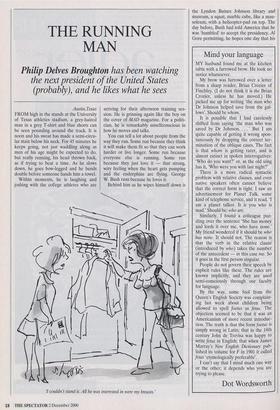Mind your language
MY husband found me at the kitchen table with a furrowed brow. He took no notice whatsoever.
My brow was furrowed over a letter from a sharp reader, Brian Crozier of Finchley. (I do not think it is the Brian Crozier, unless he has moved.) He picked me up for writing 'the man who Dr Johnson helped save from the gal- lows'. Should be whom.
It is possible that I had carelessly shifted from saying 'the man who was saved by Dr Johnson. . . . ' But I am quite capable of getting it wrong spon- taneously by dropping the correct ter- mination of the oblique cases. The fact is that whom is getting rarer, and is almost extinct in spoken interrogatives: 'Who do you want?' or, as the old song has it, 'Who were you with last night?'
There is a more radical syntactic problem with relative clauses, and even native speakers often cannot believe that the correct form is right. I saw an advertisement for Planet Talk, some kind of telephone service, and it read, 'I am a planet talker. It is you who is mad.' Should be: who are.
Similarly, I found a colleague puz- zling over the sentence 'She has money and lords it over me, who have none.' My friend wondered if it should be who has none. It should not. The reason is that the verb in the relative clause (introduced by who) takes the number of the antecedent — in this case me. So it goes in the first person singular.
People do not govern their speech by explicit rules like these. The rules are known implicitly, and they are used semi-consciously through our faculty for language.
By the way, some fool from the Queen's English Society was complain- ing last week about children being allowed to spell foetus as fetus. The objection seemed to be that it was an Americanism of more recent introduc- tion. The truth is that the form foetus is simply wrong in Latin; that in the 14th century John de Trevisa was happy to write fetus in English; that when James Murray's New English Dictionary pub- lished its volume for F in 1901 it called fetus 'etymologically preferable'.
I can't say that I mind much one way or the other; it depends who you are trying to please.
Dot Wordsworth


















































































 Previous page
Previous page